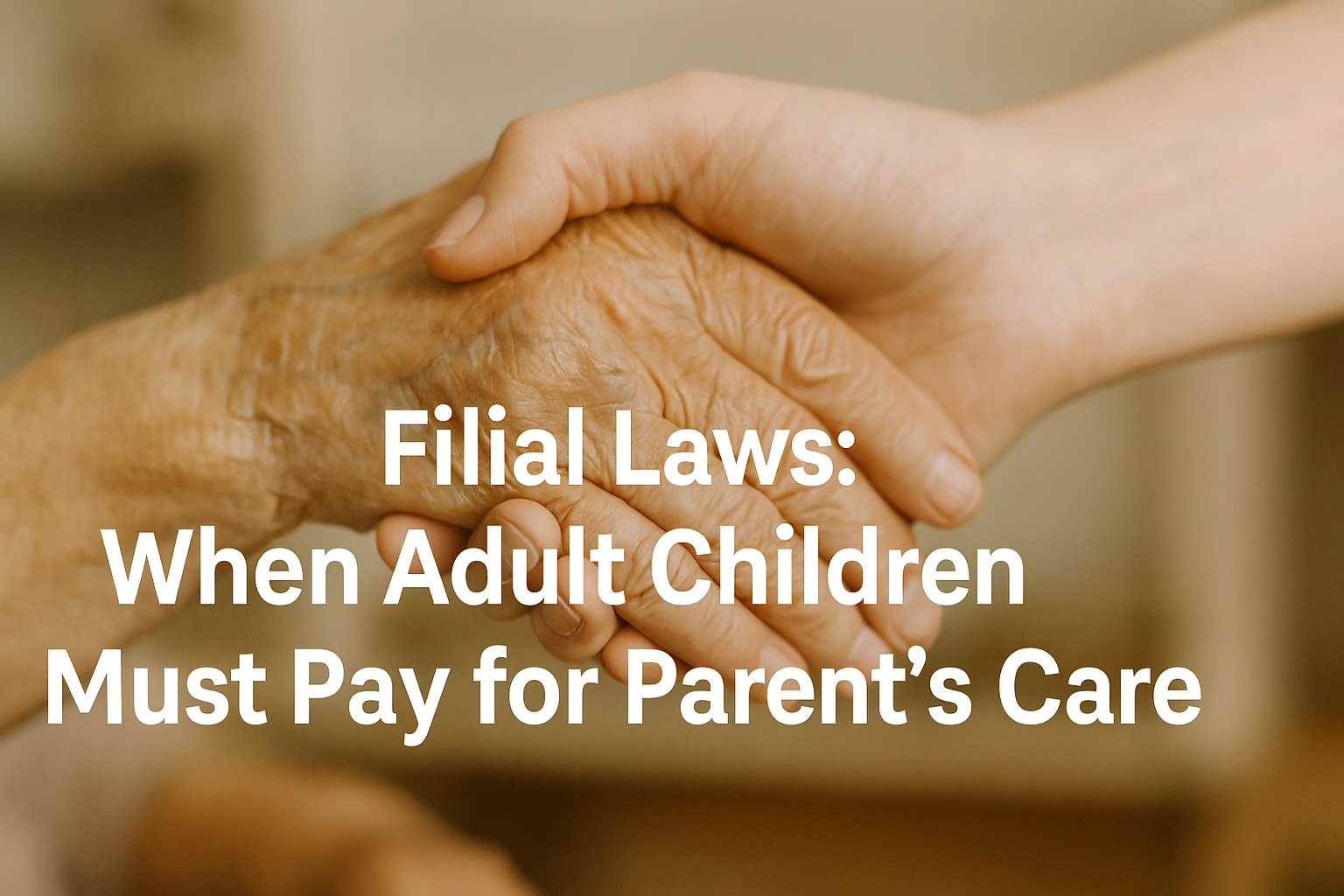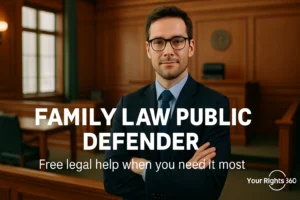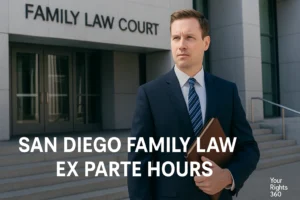Most people think the law only requires parents to care for their children. In many states, that is not the full story. Some laws say adult children must support their parents too. These rules are called filial responsibility laws.
Filial laws place financial duty on children when a parent becomes poor, sick, or needs care. These laws are not new. They go back hundreds of years. Many states still have them. Some even use them in court today. Most families do not expect this type of law to affect them until it does.
You may believe government programs like Medicaid cover nursing homes and elder care. That is true in many cases, but not always. If a parent has no money, and if Medicaid does not apply, the state or care provider may sue the adult child for the cost.
This article gives a full look at how filial laws work. It shows where they still exist, when they apply, and how to prepare before legal trouble starts. If you have aging parents, this guide helps you protect yourself and your future.
What Filial Laws Mean
Filial laws create a legal link between adult children and their aging parents. These laws say children may have to help if a parent cannot meet basic needs. That includes food, shelter, health care, or long-term nursing home costs.
The law does not always force payment. In some states, the law is old and rarely used. In others, it still plays a real role in court cases. Even if you do not expect it, you could face a lawsuit for unpaid bills tied to your parent’s care.
These laws are civil, not criminal. You will not face jail time. But if the court decides you must pay, the bill could be large. The care provider may win the right to collect money from your income, savings, or assets.
The laws are not the same in every state. Some protect children who live in poverty. Others allow full payment claims even if the parent caused harm in the past. Knowing your state law makes a big difference.
Where Filial Laws Still Apply
Many people do not know which states still follow these laws. Around 25 to 30 states still have some form of filial responsibility in their legal code. Some use it more than others.
Pennsylvania is the state most known for enforcing this law. In 2012, a nursing home sued a man for his mother’s unpaid bill. The court made him pay nearly $90,000. That case opened many eyes.
Other states with similar laws include North Carolina, Ohio, South Dakota, and Indiana. Maryland, Massachusetts, and Connecticut also have active statutes. In these states, adult children may be held responsible in the right legal situation.
Some states have removed filial laws from their code. California, Florida, New York, and Texas are among them. In these states, you cannot be forced to pay unless you sign a contract.
Still, laws can return or change. Some states keep old laws on the books even if they do not use them often. Others may revive them when public costs rise. Do not assume the law will always stay the same.
How These Laws Take Effect
A filial law case usually starts when a parent enters long-term care and cannot pay. The care provider tries to collect from the parent’s funds. If that fails, they may look to Medicaid. If the parent does not qualify or the payment falls short, the provider may sue the child.
The court looks at the adult child’s income, the parent’s situation, and the reason the care was needed. If the child has a stable job and savings, the judge may order them to pay part or all of the bill. If the child cannot pay or was not involved, the court may reduce the amount or dismiss the case.
Filial cases often include complex family facts. Some parents live far from their children. Some children do not have contact with the parent. Others had a bad relationship or were abused. These facts may matter to the court, but not always. Some laws do not include exceptions for past harm.
Each case depends on state law, court rules, and the facts. But the risk is real. A simple care bill can become a court case with large costs if no one prepares.
Filial responsibility laws differ by state and can involve court rules you may not expect, such as those explained under Rule 32, which often affects how legal procedures unfold in family-related cases.
Medicaid and Filial Law Gaps
Most people think Medicaid covers elder care. It does in many cases. But to qualify, the parent must meet strict limits on income and assets. If they own a home, have savings, or receive a pension, they may not qualify right away.
Even after approval, Medicaid may not cover all costs. Private rooms, special services, and early care may fall outside the plan. These gaps leave room for bills to build up. The provider may try to collect from the children under state filial laws.
This mix of rules creates confusion. Federal law sets Medicaid policy, but states manage it. States with filial laws may allow care providers to file claims even when the parent applied for aid.
Adult children often learn this too late—after the bill comes or the lawsuit starts. The best defense is to understand the risks before a parent needs care.
Can Someone Sue You?
Yes. If you live in a state with an active filial law, and your parent gets care they cannot pay for, you may face a lawsuit. It does not matter if you signed any paper or took part in the care choice. The provider may still take legal action.
You may face legal risk even if you live in a different state. Courts sometimes allow cross-border cases if your parent lives in a filial law state. Your location does not always protect you.
Courts look at your income, your role, and the cost of care. If you helped pay, the court may credit you. If you refused to help, the court may use that against you. In some states, all children may be named in one case. The judge may assign each one a share.
Steps You Can Take Now
If you have aging parents, take action now. You may avoid court and reduce stress later with a few smart steps.
Start with a talk. Speak with your parents about their money, their wishes, and their care plan. Find out if they have savings or long-term care insurance. Offer to help them apply for Medicaid early if they qualify.
Look into your state laws. Learn if your state, and your parent’s state, have filial rules. See if they enforce them. Read the fine print and check dates. Laws change, and old news may be wrong.
Do not sign care papers without reading them. Some care homes ask children to sign as “responsible party.” That may create a private duty to pay, even without the law. Say no to any paper you do not understand. Ask a lawyer before you sign.
Help your parents plan. They can speak with an estate lawyer to set up a trust, will, or power of attorney. These tools help control money and care without risk to others.
What If You Get Sued?
If a court sends you a notice about a filial case, do not ignore it. Call a lawyer right away. Missing deadlines can lead to automatic loss. The court may rule against you without hearing your side.
Collect records that show your own income, your parent’s costs, and any help you gave. Bring proof that you were not involved in their care or had no control over their choices. In some cases, you may argue that the care provider failed to seek payment through Medicaid first.
Some states allow defense if the parent abused or neglected the child. Other states allow the court to assign costs based on fairness, not strict duty. Your lawyer can help you make the best case based on your facts.
False Beliefs That Can Hurt You
Many people trust myths that lead to trouble. Some think filial laws are no longer active. Others think Medicaid pays for everything. Both beliefs are risky.
You may also believe that you only owe money if you signed something. That is not true in states with filial laws. The law alone can create the duty, even if you never touched a pen.
Another false idea is that only rich children get sued. In truth, any working adult may face a claim. Courts often ask if you can pay, not if you are wealthy.
What the Law May Force You to Pay
If a court finds you responsible, you may owe part or all of your parent’s care bill. This can include monthly fees, late charges, legal costs, and even interest. Some bills reach thousands or even tens of thousands of dollars.
The court may allow the provider to collect from your bank account or paycheck. In some cases, they may place a lien on your property. A court ruling becomes a legal debt you must follow.
If you share this duty with siblings, the court may divide the total. But you could still face stress, cost, and long-term debt. That is why early steps matter more than you think.
If you face legal action tied to unpaid care costs, a firm like Benchill Personal Injury Solicitors may help you understand your rights and build a strong defense.
Conclusion
Filial laws do not affect every family, but they exist in many places. They may force adult children to pay for a parent’s care. These laws raise hard questions about fairness, duty, and legal risk. Still, the law is the law. Ignoring it does not make it go away.
If your parent is aging, or already in care, take steps now. Learn your rights. Study your state’s law. Talk to your family. Speak to a lawyer if needed. Waiting often makes things worse.
This is not just about bills. It is about staying safe, making smart choices, and avoiding surprises that could damage your future. Know the law. Know your risks. Protect yourself the right way.
Disclaimer: This article is for general information only. It does not give legal advice. Please speak to a licensed attorney for advice about your own case or state law.




